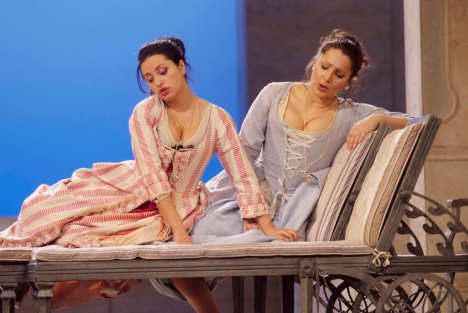Other Links
Editorial Board
-
Editor - Bill Kenny
-
Deputy Editor - Bob Briggs
Founder - Len Mullenger
Google Site Search
SEEN AND HEARD INTERNATIONAL OPERA REVIEW
Mozart, Così Fan Tutte:
Soloists, Orquestra de la Comunitat Valenciana. Coro de la
Generalitat Valenciana. Conductor: Tomas Netopil.
Palau de les Arts de Valencia. 2. 3.2009. (JMI)
T
Production from the Glyndebourne Festival.
Direction: Nicholas Hytner (original) Bruno Ravella (revival)
Sets
and Costumes: Vicki Mortimer
Lighting: Paule Constable
Cast:
Fiordiligi: Barbara Frittoli
Dorabella: Nino Surguladze
Ferrando: Joel Prieto
Guglielmo: Joan Martín-Royo
Don Alfonso: Natale de Carolis
Despina: Isabel Bayrakdarian.

This production by Nicholas Hytner was premiered in May of 2006 in
Glyndebourne and was revived the following year.
It was well
received in general, although without huge enthusiasm. The
production follows well Giorgio Strehler's
habit of providing a simple staging, good colour in the costumes and atrezzo elements, and with the luminosity of the Mediterranean (we
are in Naples) always present. It is, therefore, a traditional
production, but with the disadvantage of having an ever-present
sense of “déjà vu
about it”. This is a pleasant work, but lacking in
originality.
The revival in Valencia was directed by Bruno Ravella
and he was not always convincing. The work with the ladies from Ferrara is good,
but the two most important characters -
from a stage point of view - Don Alfonso and Despina,
were not given the
sufficient prominence.
The young Czech conductor Tomas Netopil returned to the pit of the Palau
de les Arts after his unpersuasive conducting for
Le Nozze last year. This time things worked
out better, but again it was not a
fully convincing performance. On this occasion his reading in the
first act was reminiscent of last year, short on
joy and
humour, although the tempi were lively
(sometimes excessively). There were serious problems between stage
and pit, particularly in the quintet Ferrando and Guglielmo's
farewell. Things
fortunately improved remarkably during the second act with a much
more interesting
reading. The Orchestra was at its usual high level, and also improved in the
second half. The chorus was very consistent, and
clearly was able to follow
Netopil's hurried baton of in the first act.
In addition to an excellent conductor Così Fan Tutte demands
a sextet of exceptional singing actors and Valencia fell
somewaht short in
this regard.
Barbara
Frittoli is one of the most important Fiordiligis of the last 12 or
15 years: there are not many sopranos as good as she is in this
role, although in the last few years we have seen some very good singers
coming along. Ms Frittoli was an outstanding Fiordiligi, singing
everything wonderfully, particularly her two most important arias “Come
Scoglio” and “Per Pietá”.
Her husband in real life, Natale De Carolis, was not quite as
impressive as Don Alfonso. His voice was short of volume and
sounded difficult and colourless in the high notes. He also failed to
convince in his interpretation of the cynical old philosopher.
The Georgian mezzo soprano Nino Surguladze was a good Dorabella,
eloquent, with a very pleasant voice, which was not
oversized for the
role, and she was good in her own two arias. Without a doubt, the Ferrarese ladies were the best thing of the evening.
Isabel Bayrakdarian, as Despina, confirmed the weak impression she
left on me last month as Poppea at the Liceu. This young soprano gives
the impression that she is paying the price for having sung
repertory which is too heavy for her voice to
soon and her Despina left much
to be desired in vocal terms. She offering an acid and unpleasant timbre
in the higher notes, and
sadly was unable to hide her
vocal deficiencies
behind
special abilities as an interpreter.
Listening to the young Puerto Rican tenor Joel Prieto sing “Un
aura amorosa” I thought how easy Mozart seems
to be and
yet how difficult it is in reality. There is no composer who better
reveals a singer’s immaturity and although Prieto's voice is very beautiful, Ferrando is too much for him at
the moment. His rendering of the this aria was plagued
with technical defects, from lack of breath control to serious pitch
problems and some too evident
vocal insecurities
although “Tradito, schernito”
went better. He is a promising tenor with a long career ahead of him
and I hope he does not take on too much too soon.
The Catalan bass-baritone Joan Martin-Royo was a good Guglielmo. This
singer has a good instrument, although the volume is somewhat small
and projection is not always perfect. He is always a very reliable
interpreter however and on this occasion I found him more convincing in
vocal terms than in his Figaro at Liceu.
The theatre (unusually) had a few empty
seats. There was a warm reception with cheers for
Barbara Frittoli
and
Nino Surguladze was also much applauded.
José M Irurzun
Picture © Palau de les Arts, Valencia
Back
to Top
Cumulative Index Page
